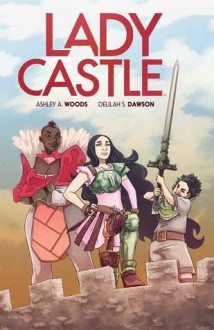
Princess Aeve has been locked up in a tower for the past six years. She'll only be let out when her father finds a husband for her who hopefully isn't too horrible. Until then, she keeps herself busy with songs, as well as letters to and from the local women, who were all left behind when their husbands, brothers, and sons went adventuring with the king.
One lone man, Sir Riddick, comes back to the castle with news that all the men were killed by a dragon and that a monster-attracting curse was cast upon the village. Merinor, who'd been acting as the local blacksmith while her husband was gone, accepts a sword from a lady in a fountain and becomes the new king. She, Princess Aeve, and Sir Riddick try to prepare everyone to face the monsters that will soon be arriving.
I found out about this graphic novel while doing a bit of research for a possible grant proposal. Ladycastle got a Virginia Library Association Graphic Novel Diversity Award honorable mention in 2017. It sounded interesting, so I requested a copy.
My description (and the publisher's) makes it sound a bit like this graphic novel has lots of women training to fight and battle monsters. Although there's a little of that, that isn't really what happens. Instead, most of the monster problems are solved in nonviolent ways, much to Sir Riddick's confusion.
The publisher's description also makes it sound a bit like the women suddenly realized that the men had done all sorts of useful tasks, once all the men were gone and they had to do those tasks themselves. Uh... That didn't really happen. In fact, the only person in the entire village who actually seemed to miss any of the men was Gwyneff, Princess Aeve's younger sister. From the sounds of things, Merinor got to do a lot more while her husband was gone than when he was around. Yanni, a disabled woman, was kept hidden by her husband and told that she was a drain on resources. Aeve was locked in a tower for years by her own father. Ms. Physik was kept as a slave. The list could go on.
There was a funeral, and the characters looked sad for a bit, but I didn't really get the impression that anyone except Gwyneff cared that all those men had died, or even had reason to care. And honestly, Gwyneff's anger at being the only upset person was somehow more annoying than anything. You'd think this town would have had at least one decent guy worth mourning. Or heck, one male child. Were there any children, aside from Gwyneff?
It was kind of fun trying to match the snippets of song lyrics throughout the volume to the tunes they were supposed to be sung to (the ones I knew without having to do some googling: Beauty and the Beast's "Little Town" and "The Fresh Prince of Bel-Air"), and the solutions to the various monster problems were creative. That said, my overall feelings for Ladycastle were only so-so.
All of the characters felt like cardboard, even Aeve, Merinor, and Gwyneff - if those three felt fleshed out at all, it was only because everyone else was so flat. The volume dug into Gwyneff and Aeve's relationship a little, as well as their relationship with their stepmother, but it was just scratching the surface. Same with Merinor, her private fears and self-doubt, and her possibly complicated feelings about her husband. And I outright snorted at Sir Riddick's out-of-the-blue epiphany about the negative aspects of chivalry. Was that one little panel supposed to count as character growth?
The artwork disappointed me a little too. It didn't look all that bad (I preferred Becca Farrow's art style to Ashley A. Woods'), but the transitions between some of the panels weren't very good. This was most noticeable in Chapter 1. In one scene, Sir Riddick was sitting at one end of the table while Merinor was standing at the other end. The next panel featured a close-up of Riddick saying something stupid and demeaning, and in the panel after that one Merinor was suddenly standing on the table in front of Riddick. I know that she had to have jumped on the table, but the actions weren't communicated as well as they could have been.
All in all, this was okay, but it felt like a joke that was stretched out longer than it should have been, starring characters who needed more room to breathe and grow.
Extras:
A cover gallery.
(Original review posted on A Library Girl's Familiar Diversions.)


 Log in with Facebook
Log in with Facebook 









